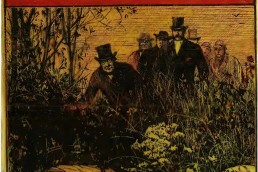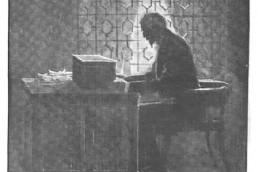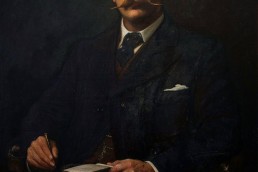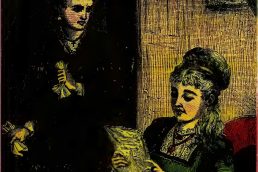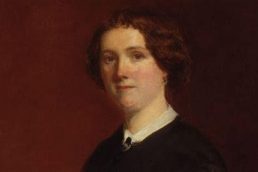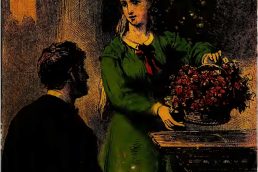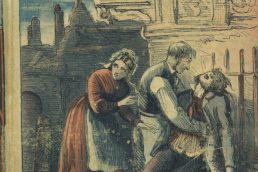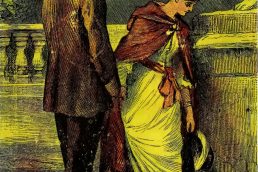Serialised fiction in the Bolton Weekly Journal - Great Porter Square (1880-81) by Benjamin Leopold Farjeon
On 30th September 1880, an advertisement appeared in the Dundee Courier announcing that the first chapters of B.L. Farjeon’s “powerful new story, will appear in the Weekly News this week” (Anon, 1880). Troy J. Bassett (2021) tells us that serialisation started on 2nd October 1880 in the Bolton Weekly Journal, the works of authors syndicated by Tillotson’s organisation appeared simultaneously in publications beyond the Bolton Weekly Journal. While Tillotson could have given his own publication the scoop, so to speak, and then followed up with serialisation elsewhere, this business decision was very smart and I can bring myself to believe that a story, never previously published, would be of greater attraction to editors and owners of periodicals than one which was ‘old hat’; the Tillotson’s financial rewards were perhaps greater, for the unlikely loss of the Bolton Weekly Journal readers in say, Dundee, for example.
An Amazon purchaser describes Great Porter Square as a novel containing “characters [who] show the perversity, cupidity, deceit, and the honourableness of human nature. Cunning must be bested by superior cunning, until justice is achieved, and in due course that justice is achieved in a very dramatic way” (Vine Voice, 2021). Newspaper critics of the period variously described Farjeon as comparable to Dickens and this must have been of great satisfaction to the author, having solicited advice from Dickens: unlike Florence Marryat, Farjeon was praised so sufficiently by his hero that he left his home in New Zealand to move to London.
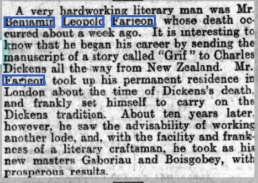

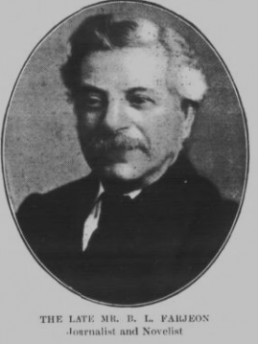

The move brought success and critical approval, as recorded in a summary of contemporaneous newspaper reviews in the Dundee Courier of Wednesday 29th September 1880 (p.1):
The Times: Mr Farjeon shows himself really equally at home in depicting the emotional and the practical aspects of existence.
Liverpool Mercury: Mr Farjeon’s genius throws a charm over everything he writes.
Harper’s Magazine, New York: It has been said […] that the mantle of Charles Dickens has fallen upon Mr. Farjeon. It is a mistake; […] his knowledge of the wants of the lowly is not derived second-hand from books […] it is indigenous.
Whilst contemporary reviews may have compared him to Dickens, the report of his death, reproduced above, suggest that he followed in the footsteps of two other writers, lesser known to modern readers: Emile Gaboriau (1832-1873) and Fortune du Boisgobey (-a nom de plume for Fortune Abraham-Dubois). Gaboriau and Boisgobey were writers of popular detective fiction. One might say that sensation fiction had paved the way for other genres of the novel where events are character-driven, such as detective fiction. From this small fact, it may be speculated that Farjeon developed his style to accommodate new popular trends. Michelle Perselle describes Farjeon as “at best a novelist of middling abilities, who achieved a modicum of success working in the sentimental realist tradition”, but she places her focus on: “how he partook of an incipient opportunity to construct a position for Jews as Englishmen in economic terms” (1999, p.203). I am drawn to this author of sensation fiction and detective fiction, who was capable of promoting the standpoint of a discriminated against minority, without detracting from his popular appeal. It would be an interesting project to read his books in chronological order, the better to trace his authorial development against the various genres he utilised.
Self-identifying as a Jew, though non-practicing, Perselle describes him as seeking “a religious and ethnic neutrality” (1999. p.203) during a period of British history when this was not acceptable. She goes on to explore the manner in which Farjeon used the economics of empire and social ambition to make himself acceptable to society and help to pave the way for British-Jewishness to also fit the mould of being a Briton, generally, rather than as the ‘Other’. Where Jewish characters appear in his novels, such as Aaron the Jew (1894), he unashamedly promotes the propaganda of equality and value in objection to the pogroms of Eastern Europe. Aaron says, for example “the Jew, fairly treated, is a good citizen, obedient to the law and loyal to the head of state” (Perselle, 1999, p.205). Farjeon wrote novels in which good triumphs over evil and (charity features as strongly as in Dickens’s work), and showing himself and his characters to be affirmatively patriotic, in opposition to the perpetuated antisemitic image of the Jew as dark, dangerous, and insidious.
Bibliography
Anon. (1880) ‘B. L. Farjeon’s Powerful New Story, Entitled 19 Great Porter Square’, The Dundee Courier, 30 September. British Newspaper Archive. [Online] Britishnewspaperarchive.co.uk. Available at: <https://www.britishnewspaperarchive.co.uk/viewer/bl/0000162/18800930/057/0002> [Accessed 31 March 2021].
Anon. (1903) ‘Literary Gossip’, The Globe, 1 August, p.6. British Newspaper Archive. [Online] Available at: <https://www.britishnewspaperarchive.co.uk/viewer/bl/0001652/19030801/063/0006> [Accessed 31 March 2021].
Anon. (1903) ‘Our Portraits’, Graphic, 1 August, p.158. British Newspaper Archive. [Online] Britishnewspaperarchive.co.uk. Available at: <https://www.britishnewspaperarchive.co.uk/viewer/bl/0000057/19030801/063/0024> [Accessed 31 March 2021].
Anon. (1880) ‘Press Notices’, The Dundee Courier, 29th September. British Newspaper Archive. [Online] Britishnewspaperarchive.co.uk. Available at: <https://www.britishnewspaperarchive.co.uk/viewer/bl/0000162/18800929/051/0001> [Accessed 31 March 2021].
Bassett, T. (2021) At the Circulating Library Periodical Information: Bolton Weekly Journal. [Online] Victorianresearch.org. Available at: <https://www.victorianresearch.org/atcl/show_periodical.php?jid=25> [Accessed 31 March 2021].
Persell, Michelle. (1999) Capitalism, Charity, and Judaism: The Triumvirate of Benjamin Farjeon. Victorian Literature and Culture, 27(1), pp.203–218. JSTOR, Available at: <www.jstor.org/stable/25058446> [Accessed 31 March 2021].
Voice, Vine, 2021. Amazon.com / customer reviews.[Online] Amazon.com. Available at: <https://www.amazon.com/Great-Porter-Square-Traditional-British-ebook/dp/B06ZZS7VXP> [Accessed 31 March 2021].
Bibliography
Colby, Robert A. (1985) “Tale Bearing in the 1890s: The Author and Fiction Syndication”. Victorian Periodicals Review. Vol.18, No.1, pp. 2-16.
Hilliard, Christopher (2009) “The Provincial Press and the Imperial Traffic in Fiction, 1870s-1930s”. Journal of British Studies. Vol.48, No.3, pp. 653-673.
Johanningsmeier, Charles (1995) “Newspaper Syndicates of the Late Nineteenth Century: Overlooked Forces in the American Literary Marketplace”. Publishing History. Vol. 37, No.1, pp. 61-82.
Jones, Aled (1984) “Tillotson’s Fiction Bureau: The Manchester Manuscripts”. Victorian Periodicals Review. Vol.17, No.1, pp. 43-49.
Singleton, Frank (1950) Tillotson’s 1850-1950: Centenary of a Family Business. Bolton: Tillotson & Son Ltd.


